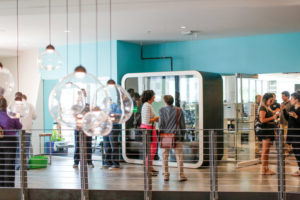Born a few kilometers away from the Harvard University campus, the Cambridge Innovation Center (CIC) has been a home for great entrepreneurs leading fast-growing companies since 1999. In 2018, CIC raised US$ 58 millions from HB Reavis, the Bratislava based real estate developer. We have interviewed Kari Mruz, the General Manager at CIC Warsaw, to find out more about CIC values, mission, strategies and plans for the future.
Hi Kari. Can you introduce yourself and explain us what CIC is and what’s its mission?
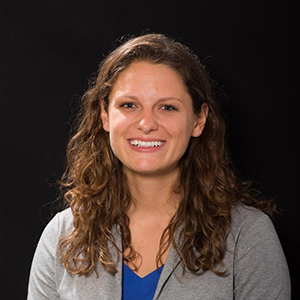
Kari Mruz
I am the General Manager at CIC Warsaw. The Cambridge Innovation Center designs, builds and operates innovation spaces and communities. We believe that innovation is the best way to solve local and global problems, so our goal is to provide entrepreneurs with the communities and infrastructure they need to succeed. In 1999, “coworking” wasn’t a household term, let alone a standard office option. That year, CIC became the first provider of shared office space in Cambridge’s Kendall Square, now known as the most innovative square mile on the planet. The mission was the same then as it is now: to support entrepreneurs in fixing the world through innovation.
How does a company from Cambridge MA, close to Harvard and other prestigious names, figures out it makes sense to replicate the model on other continents?
There are talented people with great ideas everywhere, not just at Harvard and MIT, and CIC seeks to support even broader impact by tapping into the innovation potential of other communities throughout the world. The more cities we go to, the bigger network effect we can create. That said, we don’t tend to rush into new cities. We spend a great deal of time developing deep partnerships and collaborating with local leaders before we begin to build anything.
How do you combine the coworking business and the training/innovation inputs you are providing? Why does it make sense to interlink the coworking and “innovation” sides?
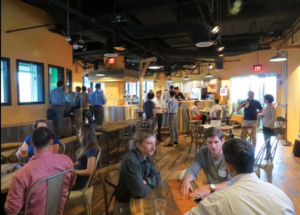
CIC and Venture Cafe, Boston-Cambridge
Coworking is naturally linked with innovation because whenever people share physical spaces, they start to bump into each other, trust each other more, take more risks, share ideas, and collaborate to create things they wouldn’t have on their own. From the other angle, coworking can benefit from innovation, because it is always more fun to work in spaces where people are doing interesting and impactful things. In terms of our business model, we find central locations in core cities to create the nexus for innovation – by leasing office space and then providing it along with additional value to our members who join our communities through a monthly agreement to work in our office space and access additional benefits that go beyond just providing snacks and furniture. The added value includes events programming, shared intellectual capital, and access to the CIC network, which includes investors and corporate innovators who seek to work with entrepreneurs.
Coworking is naturally linked with innovation because whenever people share physical spaces, they start to bump into each other, trust each other more, take more risks, share ideas, and collaborate to create things they wouldn’t have on their own.
You raised capital, as did some other big international coworking players, recently. How do you differentiate from these other brands?
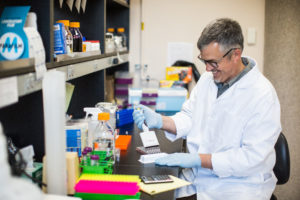
Lab at CIC
Similar to other big coworking players, we do aim to change the nature of workspaces, but primarily as a means to innovation, not just to make office life cooler. CIC’s type of deep, concentrated “innovation communities” are not simple to build. Our locations require very capable senior leadership and thoughtful staffing to thoroughly support the entrepreneurs who choose to work in our spaces. Also, keeping innovation as our central premise means that we end up building not just game rooms with ping pong tables, but also more complicated pieces like shared lab spaces and equipment that draw in scientists and technologists. This means we’ll probably expand slower than some of the other big players, with the intention of creating powerful ecosystems that generate long-lasting, impactful innovations.
Keeping innovation as our central premise means that we end up building not just game rooms with ping pong tables, but also more complicated pieces like shared lab spaces and equipment that draw in scientists and technologists
CIC is opening up in Warsaw and has already a location in operation in Rotterdam. What are the plans for Europe?
CIC is exploring a number of other locations in Europe and open to initiating discussions with other cities as well through our expansion initiatives. Our goal is to have 50 locations open in ten years, and Europe is a significant part of our growth plan as well as other regions globally.
Our goal is to have 50 locations open in ten years, and Europe is a significant part of our growth plan as well as other regions globally.
Why does Europe makes sense to you and how does it differentiate from the US or Asia?

CIC Rotterdam
European communities are unique, with each country offering its own set of innovators who respond differently to coworking environments. CIC looks to enter markets that are receptive to creating an impact through innovation. We partner with cities that understand how an innovation center can attract entrepreneurs and stimulate economic development, and work closely with local leaders to ensure that our strategies align with the region. We take a local, community-focused approach in all the ecosystems we build, whether it’s in Europe, the U.S., Asia, or elsewhere.
You will be located in the second tallest building in Europe to be completed soon in Warsaw. Does locating yourself in prime buildings belong to your strategy?
Choosing the right location and facility is really important for us, we’re really picky. We look for facilities that can provide a premium experience for our members, and locations that have the potential to be the center of gravity for innovation in the city. We couldn’t have picked a better location than the Varso tower complex in Warsaw. Not only will the Varso tower be one of the tallest building in Europe, but it will have direct underground access to the central train station, and huge floor plates in the Varso 2 building we will be located in, allowing us to build large event spaces on the same floor as our office space offering.
You focus on some specific industries, such as “port activities” in Rotterdam. Is the focus a case by case assessed choice or are you globally focusing on a limited number of areas?
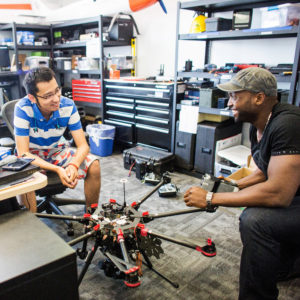
CIC St Louis
A focus on specialized industries is one of the things I’m most excited about for CIC’s future. For now many of these are very case by case, determined by the particular strengths and goals of a given city. However, ultimately these communities can and should be linked – for example, technology developed in our robotics community in Boston could be used in a port in Rotterdam.
Ultimately these communities can and should be linked – for example, technology developed in our robotics community in Boston could be used in a port in Rotterdam.
Join us at Coworking Europe Conference for more insights, data and connections!

